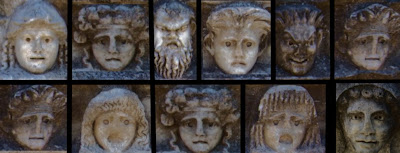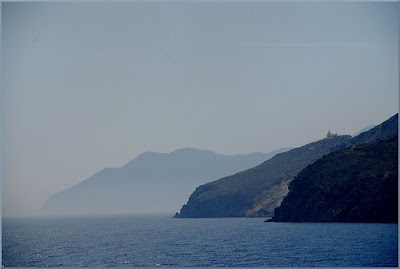 Odeon of Herodes Atticus, shot from up the hill, on The Acropolis - click to enlargeTonight, we will go see Aristophane's
Odeon of Herodes Atticus, shot from up the hill, on The Acropolis - click to enlargeTonight, we will go see Aristophane's last play,
Plutus at the Odeon of Herodes Atticus, just a few blocks from our hotel. The play is being put on, oddly enough by the Cyprus Theatre Organisation. It is part of a drama, music and arts Athens Festival that takes place most of the summer in Athens.
When Pausanias visited Athens during the reign of Marcus Aurelius, he described the Herodeon as "the finest building of its type". I was not longer after destroyed by fire, and later, rebuilt in 161 AD by Herodes Atticus in memory of his wife. It was originally a steep-sloped amphitheater with a three-story stone front wall and a wooden roof, and was used as a venue for music concerts with a capacity of 5,000. It was later buried, plundered for its stone, and restored in the middle 20th century. It is probably best known (is this pathetic or what) as the venue for Yanni's Live At The Acropolis in the early 1990's.
Here are the opening lines of Aristophenes' play, Plutus [1]. We will be watching it in Greek, but I do have an English text. We suspect it will somehow be captioned (like they do in opera).
[The Orchestra represents a public square in Athens. In the background is the house of CHREMYLUS. A ragged old blind man enters, followed by CHREMYLUS and his slave CARIO.]CARIO What an unhappy fate, great gods, to be the slave of a fool!
A servant may give the best of advice, but if his master does not
follow it, the pool slave must inevitably have his share in the disaster;
for fortune does not allow him to dispose of his own body, it belongs
to his master who has bought it. Alas! 'tis the way of the world.
But the god, Apollo, (in tragic style) whose oracles the Pythian
priestess on her golden tripod makes known to us, deserves my censure,
for surely he is a physician and a cunning diviner; and yet my master
is leaving his temple infected with mere madness and insists on following
a blind man. Is this not opposed to all good sense? It is for us,
who see clearly, to guide those who don't; whereas he clings to the
trail of a blind fellow and compels me to do the same without answering
my questions with ever a word. (To CHREMYLUS) Aye, master, unless
you tell me why we are following this unknown fellow, I will not be
silent, but I will worry and torment you, for you cannot beat me because
of my sacred chaplet of laurel.
CHREMYLUS No, but if you worry me I will take off your chaplets,
and then you will only get a sounder thrashing.
CARIO That's an old song! I am going to leave you no peace till you
have told me who this man is; and if I ask it, it's entirely because
of my interest in you.
CHREMYLUS Well, be it so. I will reveal it to you as being the most
faithful and the most rascally of all my servants. I honoured the
gods and did what was right, and yet I was none the less poor and
unfortunate.
CARIO I know it but too well.
CHREMYLUS Others amassed wealth-the sacrilegious, the demagogues,
the informers, indeed every sort of rascal.
CARIO I believe you.
CHREMYLUS Therefore I came to consult the oracle of the god, not
on my own account, for my unfortunate life is nearing its end, but
for my only son; I wanted to ask Apollo if it was necessary for him
to become a thorough knave and renounce his virtuous principles, since
that seemed to me to be the only way to succeed in life.
CARIO (with ironic gravity) And with what responding tones did the
sacred tripod resound?
CHREMYLUS You shall know. The god ordered me in plain terms to follow
the first man I should meet upon leaving the temple and to persuade
him to accompany me home.
CARIO And who was the first one you met?
CHREMYLUS This blind man.
CARIO And you are stupid enough not to understand the meaning of
such an answer! Why, the god was advising you thereby, and that in
the clearest possible way, to bring up your son according to the fashion
of your country.
CHREMYLUS What makes you think that?
CARIO Is it not evident to the blind, that nowadays to do nothing
that is right is the best way to get on?
CHREMYLUS No, that is not the meaning of the oracle; there must be
another that is nobler. If this blind man would tell us who he is
and why and with what object he has led us here, we should no doubt
understand what our oracle really does mean.
CARIO (to PLUTUS) Come, tell us at once who you are, or I shall
give effect to my threat. (He menaces him.) And quick too, be quick,
I say.
PLUTUS I'll thrash you.
CARIO (to CHREMYLUS) Do you understand who he says he is?
CHREMYLUS It's to you and not to me that he replies thus: your mode
of questioning him was ill-advised. (To PLUTUS) Come, friend, if
you care to oblige an honest man, answer me.
PLUTUS I'll knock you down.
CARIO (sarcastically) Ah! what a pleasant fellow and what a delightful
prophecy the god has given you!
CHREMYLUS (to PLUTUS) By Demeter, you'll have no reason to laugh
presently. . .
[1] The plot: The plot is of the simplest. Chremylus, a poor but just man, accompanied by his body-servant Cario--the redeeming feature, by the by, of an otherwise dull play, the original type of the comic valet of the stage of all subsequent periods--consults the Delphic Oracle concerning his son, whether he ought not to be instructed in injustice and knavery and the other arts whereby worldly men acquire riches. By way of answer the god only tells him that he is to follow whomsoever he first meets upon leaving the temple, who proves to be a blind and
ragged old man. But this turns out to be no other than Plutus himself, the god of riches, whom Zeus has robbed of his eyesight, so that he may be unable henceforth to distinguish between the just and the unjust. However, succoured by Chremylus and conducted by him to the
Temple of Æsculapius, Plutus regains the use of his eyes. Whereupon all just men, including the god's benefactor, are made rich and prosperous, and the unjust reduced to indigence.
---o0o---












